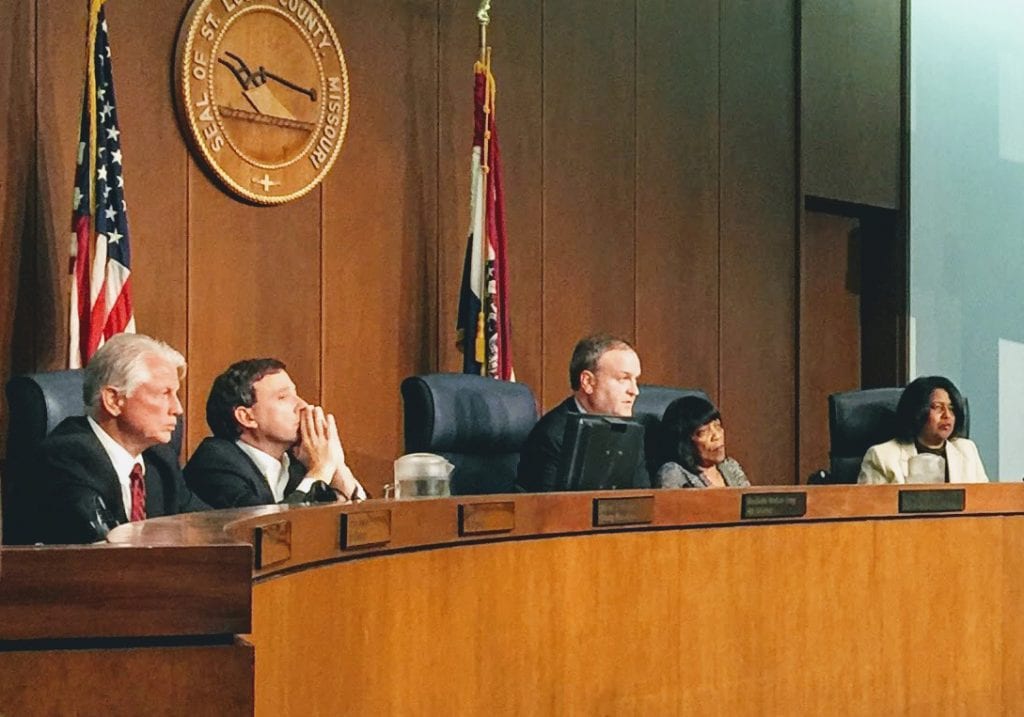By Gloria Lloyd
Staff Reporter
news3@callnewspapers.com
County Executive Steve Stenger and the County Council have been at odds for most of the last year on everything except routine county business, but now they have something in common: They are both accused of violating the Sunshine Law.
The council is taking Attorney General Josh Hawley’s lawsuit against Stenger’s office for allegedly violating the Sunshine Law so seriously that they have halted the county’s decades-long practice of destroying old records — but now Hawley has asked the council to explain its own potential Sunshine violation.
At the same time, an outside attorney defending Stenger in Hawley’s lawsuit argued that the county executive’s office cannot be sued because it does not actually exist as a separate entity from county government under the county Charter.
And as the nation celebrates Sunshine Week as a time to educate about the Sunshine Law, lawsuits about the law are not just happening at the county level, either. The Sunshine Project sued Gov. Eric Greitens alleging that he uses a text-messaging app for public business that permanently destroys text messages called Confide.
University City resident Tom Sullivan filed a complaint with Hawley in December alleging that Chairman Sam Page, D-Creve Coeur, and the council violated the Sunshine Law by not providing at least 24 hours’ notice that they planned to slash the $696 million county budget by $31 million.
The council met in a rare closed session after a special meeting last week — called with 24 hours and eight minutes’ notice — to approve a response to those allegations, council members told the Call.
But County Clerk Genevieve Frank declined to make any votes public, citing pending legal issues.
The Dec. 12 meeting agenda listed Stenger’s budget bills, with no mention of any cuts. To Sullivan, that did not meet the law’s criteria that a day’s notice be given so the public knows exactly what will be discussed at a meeting.
Page filed a series of substitute bills for each county department hours before the meeting. The bills cut so close to the meeting time that the sole vote against them, 5th District Councilman Pat Dolan, D-Richmond Heights, said he never saw them before the meeting.
The Sunshine Law is designed to keep surprises like that to a minimum, Sullivan noted.
“Anyone wishing to support or oppose the changes before the council vote did not have the opportunity to do so, either by contacting their council member or speaking at the council meeting,” Sullivan said. “Allowing that opportunity is one of the main purposes of the Sunshine Law.”
The council planned to make its response public, but had not yet done so at the time the Call went to press.
“We believe that we’ve complied with the law,” said 6th District Councilman Ernie Trakas, R-Oakville.
Page, who is listed by name in Sullivan’s complaint and was the sponsor of the budget bills, said he believes the council not only complied with the county Charter and state law but exceeded the transparency of councils in the past during six weeks of budget talks.
“We held an unprecedented 38 hearings and many hours of public testimony,” Page said. “I appreciate Tom Sullivan’s concerns. He plays a valuable role as a watchdog of county government.”
But Sullivan said in his complaint that the $31 million in budget cuts took him by surprise, despite the fact that he had attended many of the budget hearings leading up to the final budget vote.
In any case, Page dropped a routine bill from the order of business last week that called for destruction of county records after they were scanned onto microfilm. The county will not destroy records until the lawsuit against Stenger is resolved, Page said.
Stenger claims his office doesn’t exist
In Hawley’s lawsuit against Stenger, outside attorney Christopher Bauman of Blitz, Badgett & Deutsch filed a response on behalf of the county executive’s office contending that the county executive’s office does not officially exist in the county Charter, so it cannot be sued.
“Plaintiff Joshua Hawley has filed this petition against a purported defendant ‘Office of the St. Louis County Executive,’” Bauman wrote in a motion to dismiss filed Feb. 26. “There is no such legal entity with capacity to be sued. While filing a petition against a non-existent defendant gave plaintiff the opportunity to issue a press release and make political and unfounded allegations, it does not give rise to a legally cognizable claim against a proper party.”
The novelty of that theory impressed Trakas, who is also an attorney. But he still doesn’t find it convincing.
“He’s in essence saying that the county executive is immune from suit because he doesn’t exist, like a chimera,” Trakas said. “But we either have a county executive or we don’t. And we have an executive, and the executive cannot act outside the law.”
Before the reply was filed, Stenger denied ever violating the Sunshine Law.
“Ultimately we’re going to be successful in that lawsuit,” Stenger said. “I don’t think there’s any doubt we complied with the law.”
The Call requested the records that Hawley alleges that Stenger did not provide, including leases, but the county denied the request since the matter is now a legal issue.
Hawley’s office also denied the request, citing the same statute.
Stenger, who is running for re-election, cited Hawley’s own political aspirations as a reason for the lawsuit. He is the front-runner in the GOP primary to take on U.S. Sen. Claire McCaskill, D-Kirkwood.
“Him scoring political points between his office and Democrats I guess is something he wants to do with the highest office in St. Louis County,” Stenger said, noting that a federal judge sanctioned Hawley the same week he filed suit against Stenger for not providing documents as part of a lawsuit on alleged police brutality. “The judge was pretty harsh in her terms of what she thought of his transparency.”



































